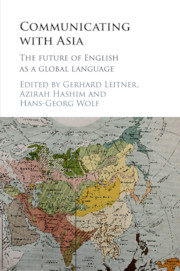Book contents
- Communicating with Asia
- Communicating with Asia
- Copyright page
- Contents
- Figures
- Tables
- Contributors
- Book part
- Communicating with Asia: introduction
- Part I English in selected regional and national habitats with a glance at the role of outward-bound communication needs
- Part II Major other languages in Asia, their international status and impact on education
- 10 Multilingualism, Hindi–Urdu and Indian English: intranational and international diaspora
- 11 Bahasa Indonesia and Bahasa Melayu: convergence and divergence of the official languages in contemporary Southeast Asia
- 12 Putonghua and Cantonese in the Chinese territories
- 13 The Chinese language in the Asian diaspora: a Malaysian experience
- 14 Russian in Far East Asia: linguistic policies on the periphery of empire
- 15 Russian and Turkic languages in Central Asia
- Part III Wider perspectives
- Bibliography
- Index
12 - Putonghua and Cantonese in the Chinese territories
from Part II - Major other languages in Asia, their international status and impact on education
Published online by Cambridge University Press: 05 January 2016
- Communicating with Asia
- Communicating with Asia
- Copyright page
- Contents
- Figures
- Tables
- Contributors
- Book part
- Communicating with Asia: introduction
- Part I English in selected regional and national habitats with a glance at the role of outward-bound communication needs
- Part II Major other languages in Asia, their international status and impact on education
- 10 Multilingualism, Hindi–Urdu and Indian English: intranational and international diaspora
- 11 Bahasa Indonesia and Bahasa Melayu: convergence and divergence of the official languages in contemporary Southeast Asia
- 12 Putonghua and Cantonese in the Chinese territories
- 13 The Chinese language in the Asian diaspora: a Malaysian experience
- 14 Russian in Far East Asia: linguistic policies on the periphery of empire
- 15 Russian and Turkic languages in Central Asia
- Part III Wider perspectives
- Bibliography
- Index
Summary
The phonological origin of the modern-day Mandarin can be traced back to the fourteenth-century northern dialect. In this chapter, the discussion on the use of Putonghua and Cantonese in the Chinese territories, the former being the national common language, and the latter a particularly vitalized regional dialect spoken in the Pearl River Delta, including Hong Kong and Macao, shall start with a brief introduction of this phonological origin and the formation of the common language in China. This will be followed by information on its spread and use in the present day, and its interaction with the Cantonese dialect in the two above-named special administrative regions of China.
- Type
- Chapter
- Information
- Communicating with AsiaThe Future of English as a Global Language, pp. 188 - 204Publisher: Cambridge University PressPrint publication year: 2016



